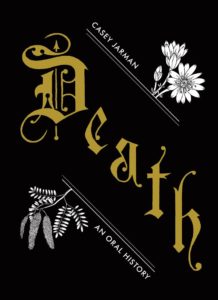Note: I received Death: An Oral History from the publisher for review consideration. All opinions are my own.

So my favorite thing about Death: An Oral History is the story of its genesis. Casey Jarman noticed that he hadn’t yet lost anyone he couldn’t afford to lose, and it started to cause him anxiety about death. He therefore decided to spend the next few years of his life talking, reading, and thinking extensively about death, with the ultimate goal of producing a collection of interviews with people familiar with death.
This is very very relatable to me. I have learned that when you are afraid of something, it’s either fine to live your life without that thing (like acid trips or the many species of spider that live in Australia) and then you are fine to go on avoiding it, or else it is diminishing/impossible to live your life without that thing (like taking long walks alone at night while a lady or people I love dying or getting a job in publishing and moving to New York without knowing anybody there) and then you have to make a decision about your priorities. I am terrible at not being afraid of things, but I am excellent at triaging. (I am too jittery and on edge to enjoy long walks alone at night, which defeats the purpose they would otherwise be serving. People I love are definitely going to die. I really wanted to work in publishing.)
Jarman interviews a wide range of people who spend their time thinking about death: a retired warden on death row who now opposes the death penalty, a grief counselor, a songwriter whose lyrics deal with the inevitability of death, a hospice volunteer. Each of his interviewees has considered death extensively from a certain angle, and each of them is able to say what they’ve learned about it, what they believe it means, how they believe people can approach it in a healthy way.
As oral histories go, I liked this one a lot. Inevitably, a few of the interviewees rubbed me the wrong way — I have no patience for woo-woo granola bullshit, and I had to quit reading the interview with the psychedelic scientist who’s convinced we could all have peaceful and pleasant deaths if only we dropped a lot of acid at the crucial time.1 Most of them, though, spoke with respect about the dead and the process of dying, and the book made me feel — and I hope made Casey Jarman feel, bless him — that there are people in this world who have the process of death under control and who can see the rest of us through it.
- Ugh okay that’s not a fair representation of her position but “psychedelic hospice” is a thing she wants to do and I just cannot with people sometimes. ↩